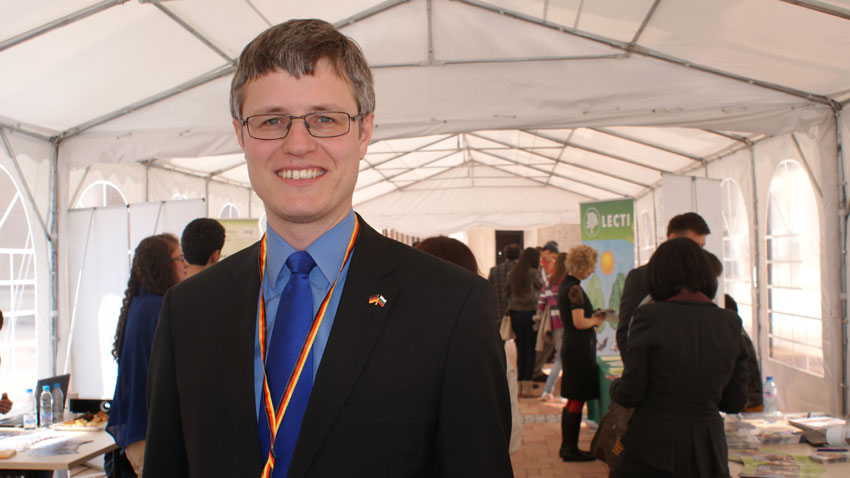Bulgarian university students in Germany are about 8000, accounting for one of the largest foreign student groups in the Federal Republic. German universities are by tradition strongly appealing for Bulgarians. Even in the early 20 c. the Bulgarian elite, mostly in engineering science, was trained in Germany. The trend is very much underway today: one reason for the German Embassy in Sofia to organize an education fair for the second time. Earlier this week, officials from more than 40 kindergartens, schools and universities from Bulgaria and Germany consulted and informed visitors about German language learning programs and opportunities to study in Germany.
Starting early in the morning, many young people gather outside the German Embassy to have a look at the booths arranged there. They take brochures away and ask questions about ways to apply for German universities. Most of them are fluent in German. Sylvia Danovska has stopped by Bavaria’s booth. She is on the lookout for a suitable MA program. She has an MA in international economic relations but is getting ready for further education in Germany.
“I am after something new and different. Both my BA and MA degrees have been obtained in Bulgaria and I now want to have an MA in Germany because I believe in the high quality of education there.”
11 grade student Dimitar Ivanov has been preparing for university training in Germany since he enrolled in high school. He has a very clear idea what he wants: to study aviation engineering. He has travelled 100 km from his native town Pleven to learn more straight from the horse’s mouth – at the booth of the Technical University in Munich.
“They have this major but only after a BA degree, with an MA program. I like the conditions at the Technical University and I have been hard to prepare for the German language exam at the high school in Pleven.”

The education fair at the German Embassy is welcome for Sylvia and Dimitar. Matthias Dehner, head of the Cultural Department at the Embassy, is happy with the great interest.
“We see the traditionally large number of Bulgarian students in Germany as a symbol of the intensive cultural exchange between the two countries”, Dehner says.
However, this process can also be seen as a brain drain from Bulgaria: “This is a fairly complex issue and is currently hotly debated in Germany. However, it should be discussed in the larger context of the European Union”, Dehner believes. “European Union’s future requires more diverse experience of its citizens, both personal and professional, gained in different member countries. Anybody who is trained in a German university is the master of his life. He shall decide whether to stay on in Germany or return for a career in Bulgaria. Our observations confirm that many Bulgarians return to their home country for successful careers here. I think that the EU develops very dynamically and with time the exchange of staff will reach a desirable balance.”
English version: Daniela Konstantinova
In the week of St. Andrew’s Day (also known as Bears’ Day or Mechkinden), WWF is drawing attention to six orphaned bear cubs who have been given a second chance at life. The initiative is part of the "Subscribe to Nature" campaign and..
For the 30th consecutive year, the Bulgarian Posts organize a contest for the most beautiful letter to Santa Claus. Letters must be sent by 18 December with a stamped envelope "For Santa", the sender's address indicated and postage paid. All..
The Varna Regional Library "Pencho Slaveykov" has acquired a humanoid robot. It was unveiled by the library's director, Radka Kalcheva, during the celebration of the 20th anniversary of the library's American Corner, in the presence of Eric Brasel, the..
According to the Annual Report on the Health Status of Bulgarian Citizens for 2023, t he main cause of death in Bulgaria is diseases of the..
At the Bulgarian Embassy in London, Prof. Bettany Hughes presented excerpts from the new BBC series - Wonders of Bulgaria. Prof. Bettany..
Over 3.5 million Ukrainians have arrived in or passed through Bulgaria since the beginning of the war. Nearly 200,000 people have found temporary..

+359 2 9336 661
